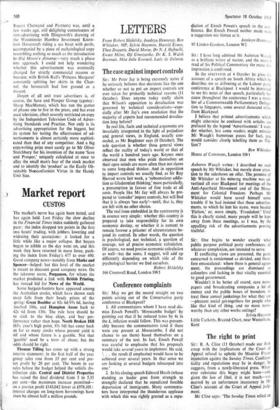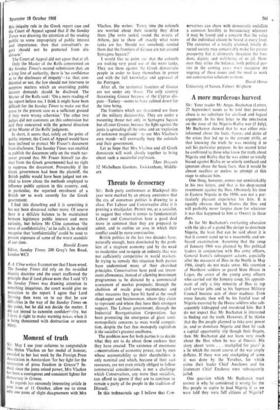The right to print
Sir: R. A. Cline (11 October) made our flesh creep with the implications of the Court of Appeal refusal to uphold the Maurice Fraser injunction against the Sunday Times. Confiden- tiality and reputations may be in danger, he suggests, from a newly-liberated press. What- ever substance this bogey might have—and. given the law of libel, it is not much—was marred by an unfortunate inaccuracy in Mr Cline's account of the Court of Appeal judg- ment.
Mr Cline says: 'The Sunday Times relied on
this iniquity rule in the Greek report case and the Court of Appeal agreed that if the Sunday Times was drawing the attention of the reading public to some impropriety of public interest and importance, then that consultant's re- port should not be protected from dis- closure.'
The Court of Appeal did not agree that at all.
Only the Master of the Rolls commented on the Sunday Times's second submission that, on s long line of authority, there is `no confidence as to the disclosure of iniquity'—i.e. that, con- fidential or not, the law should not intervene to suppress matters which an overriding public interest demands should be disclosed. The Master of the Rolls said: 'On a mere reading of the report before me, I think it might have been difficult for the Sunday Times to make out that cause in the present case as a sufficient ground if they were wrong otherwise.' The other two judges did not comment on this submission but said they concurred with the general direction of the Master of the Rolls' judgment.
In short, it seems that, solely on the point of public interest, the Court of Appeal would have been inclined to protect Mr Fraser's document from disclosure. The Sunday Times was enabled to publish the document only on the much nar- rower ground that Mr Fraser himself (as dis- tinct from the Greek government) had no right to suppress the document. Presumably if the Greek government had been the plaintiff, the British public would have been judged not en- titled to know about the methods employed to influence public opinion in this country, and, in particular, the reported enrolment of a British MP to work covertly for the Greek government.
I find this disturbing and it is surprising it has not been discussed rather more. Of course there is a deliCate balance to be maintained between legitimate public interest and mere
curiosity, but before Mr Cline canonises 'the cause of confidentiality,' as he calls it, he should recognise that 'confidentiality' could be used to prevent exposure of some of the worst scandals of our time.. Harold Evans Editor, Sunday Times, 200 Gray's Inn Road, London WC1 R. A. Cline writes: I cannot see that I have erred.
The Sunday Times did rely on the so-called iniquity doctrine and the court reaffirmed the principle that if (and please note that I said 'if') the Sunday Times was drawing attention to something iniquitous, the court would give no protection to the report. I agree that Lord Denning then went on to say that he saw difficulties in the way of the Sunday Times on this point, but he' did not decide the matter. I did not intend to canonise confidentiality, but I think it right to make warning noises when it Is being threatened with destruction or severe
Injury.







































 Previous page
Previous page